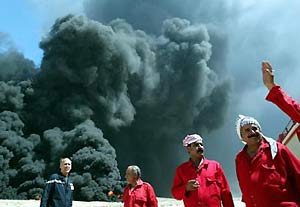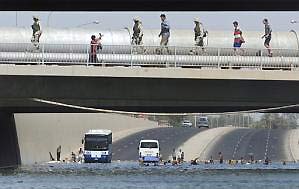Saboteurs hit Iraqi oil, water supply
( 2003-08-18 08:46) (Agencies)
Saboteurs blew up a water main in northern Baghdad on Sunday, forcing engineers to cut off water to the entire capital and raising new concerns that insurgents are hitting Iraq's infrastructure to slow its recovery.
 |
| Iraqi firefighters chat at the scene of the second blaze next to the damaged oil pipeline near the northern Iraqi town of Baiji, Aug. 17, 2003. [AP] |
The water main bombing came as two oil fires raged out of control along an oil pipeline to Turkey, halting exports just days after they started. The first blaze appeared to be sabotage, a coalition spokesman said.
In new violence, a mortar attack on a Baghdad prison being used by the United States killed six Iraqis. Hours later, a cameraman for the Reuters news agency was mistakenly shot and killed by U.S. soldiers while filming outside the prison.
A new group of resistance fighters has said they would battle the U.S.-led occupation whether or not it helps rebuild the country.
Sunday's explosion in northern Baghdad blew a hole in a 5-foot-diameter water main, flooding streets. People waded through chest-high water in some areas. Witnesses said two men on a motorbike left a bag of explosives and detonated it minutes later.
 |
| U.S. troops inspect a damaged water pipe as young Iraqis cool themselves in a flooded underpass, Aug. 17, 2003, in northern Baghdad, Iraq. An explosion blew a gaping hole in a water main with a 5 1/4-foot (1.6-meter) diameter early Sunday, flooding streets and forcing engineers to cut off water to all of Baghdad. Witnesses said they saw two men on a motorbike leaving a bag of explosives under the pipe detonating it minutes later. [AP] |
"It was an act of sabotage," said Majid Noufel, a Baghdad water company engineer. "We've had to stop pumping water to the whole city so we can fix the damage."
Residents, finding their taps dry, rushed to buy bottled water but many stores ran out.
"I couldn't find any water to wash the clothes," lamented housewife Amira Ali, 46. "The next few days we're really going to suffer."
A new group of resistance fighters, the Iraqi National Islamic Resistance Movement, said in a videotaped aired on the Al-Jazeera television network that they would battle the occupying troops even if the U.S.-led coalition helps Iraq recover from war.
"This resistance is not a reaction to the American provocations against the Iraqi people or to the shortage of services, as some analysts believe ... but to kick out the occupiers as a matter of principle," a man read from a statement.
He sat with several other men holding grenade launchers and Kalashnikov automatic rifles. All had their faces covered with checkered headscarves.
U.S. military spokesman Spc. Anthony Reinoso said Sunday that someone fired two mortar rounds at the notorious Abu Ghraib prison the previous night, killing six Iraqis and wounding 58. He didn't know whether the casualties were guards or prisoners, or who was responsible.
The motivation was unclear. Abu Ghraib, where Saddam's regime executed political prisoners and others, is being used by Iraq's U.S. occupiers to house high-security criminals. U.S. troops at and near the prison have been attacked in past months.
Reuters cameraman Mazen Dana, 41, was filming outside the prison when he was shot by U.S. soldiers.
A Reuters staffer said on condition of anonymity that the videotape in Dana's camera showed two U.S. tanks coming toward him. Two shots, apparently from the tanks, rang out and Dana fell to the ground. He was taken away by a U.S. helicopter for treatment.
A U.S. military official said on condition of anonymity that American soldiers saw Dana from a distance and mistook him for an Iraqi guerrilla, so they opened fire. When the soldiers came closer, they realized Dana was a journalist, the official said.
Stephen Jukes, Reuters' global head of news, said, "Mazen was one of Reuters' finest cameramen and we are devastated by his loss."
Further north, two blazes a few miles apart raged out of control along the 600-mile pipeline exporting Iraq's oil to Turkey.
The first fire began Friday, only two days after oil exports to Turkey resumed, and the second started Saturday night. The fires were 125 miles northeast of Baghdad.
Coalition spokesman Charles Heatly said the first blaze appeared to be sabotage. Police commander Brig. Gen. Ahmed Ibrahim vowed to pursue "a group of conspirators who received money from a particular party" to blow up the pipeline.
Iraqi firefighters watched helplessly as thick, black smoke billowed a quarter-mile into the air. Supervisor Abdul Khaliq Akrum Fatah said two fires breaking out in such a short stretch of pipeline "is unheard of and very mysterious."
"They have already closed the pipeline, so all we can do is wait for the remaining oil to burn," he said.
Military spokesman Col. Guy Shields said it would take up to two weeks to fix the pipeline.
Iraq has the world's second-largest proven crude reserves, at 112 billion barrels, but its pipelines, pumping stations and oil reservoirs are dilapidated after more than a decade of neglect. Northern Iraq, site of the giant Kirkuk oil fields, accounts for 40 percent of Iraq's oil production.
L. Paul Bremer, the U.S. civilian administrator of Iraq, opened the first meeting of a group that will coordinate international donations to Iraqi reconstruction.
"The irony is that Iraq is a rich country that is temporarily poor," he said. "An event such as the explosion on the Kirkuk pipeline costs the Iraqi people $7 million a day and hurts the process of reconstruction."
He said the group would prepare a list of needed projects for donors to invest in and expected specific pledges at an October conference in Madrid, Spain.
Also Sunday, an Iraqi Governing Council delegation arrived in the United Arab Emirates to begin a regional tour to drum up political cooperation and possible economic aid from fellow Arab countries.
Meanwhile, U.S. troops shut down a major bomb-making facility near Tikrit, arresting two people, Lt. Col. Steve Russell of the 4th Infantry Division said. Troops seized C-4 plastic explosives, mortars, automatic rifles and other equipment.
The Danish army reported one of its soldiers died from a gunshot after stopping a truck of Iraqis on Saturday in southern Iraq. Military authorities said it appeared the soldier was killed by friendly fire. He was the first Dane killed since Denmark sent about 400 soldiers to join the stabilization force around Basra.
Two Iraqis died in the shootout, one was wounded and six were arrested, the Danish army command said.
Near Baquoba, 45 miles north of Baghdad, U.S. forces captured 12 suspected Fedayeen Saddam militia members near a U.S. base, said Lt. Col. Mark Young, commander of 3rd Battalion, 67th Armor Regiment, 4th Infantry Division.
An informer, who lived near the battalion's base at a former Iraqi military camp, told U.S. troops that Fedayeen were in the area, trying to make residents leave before attacking the base, Young said.
|

